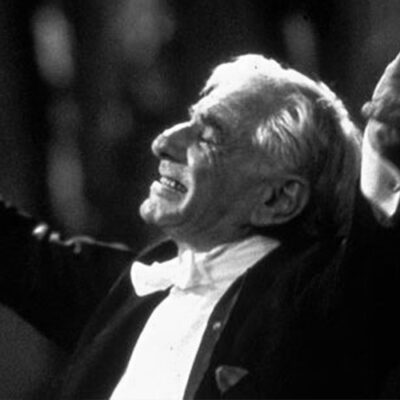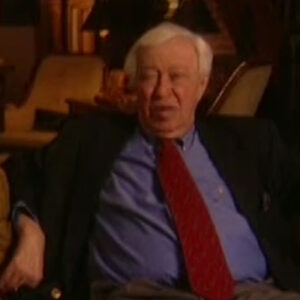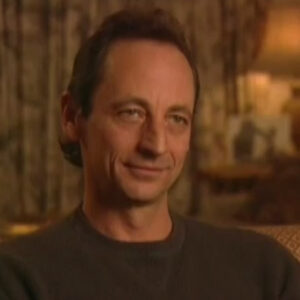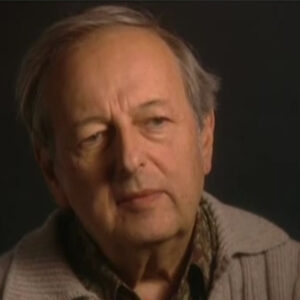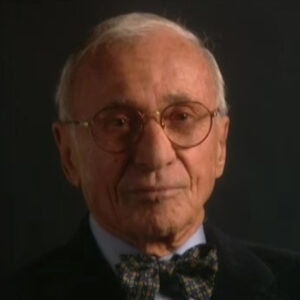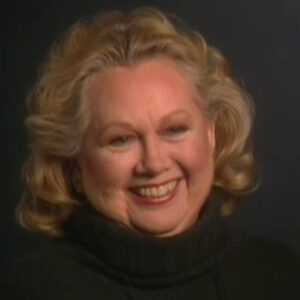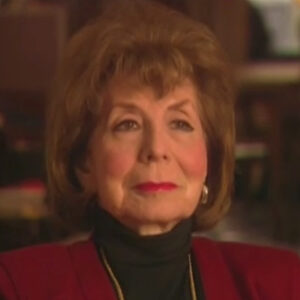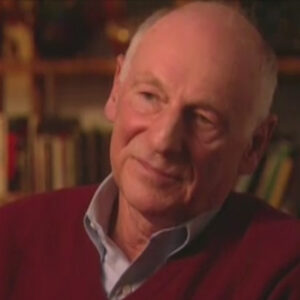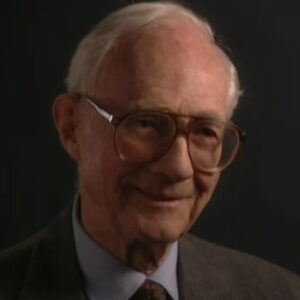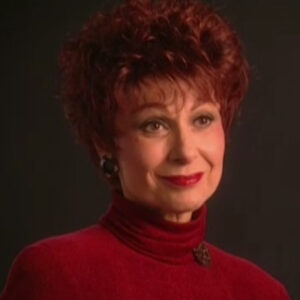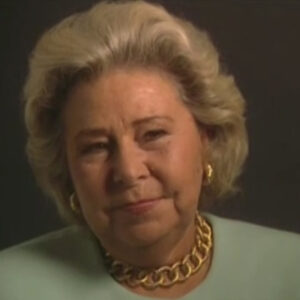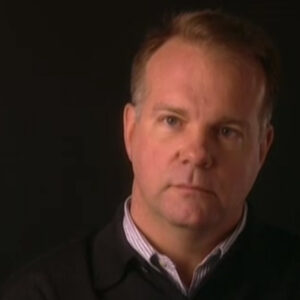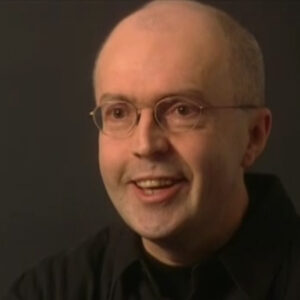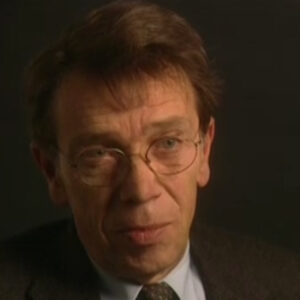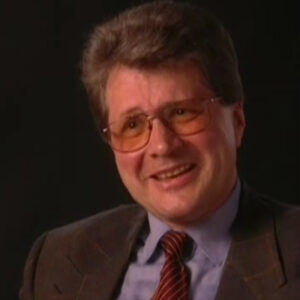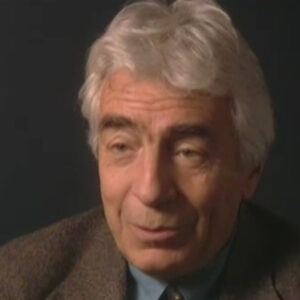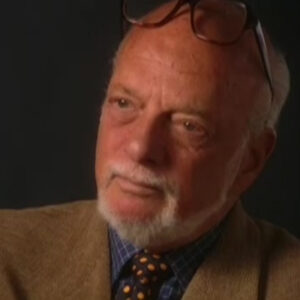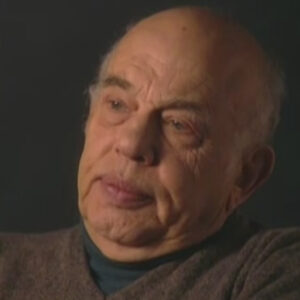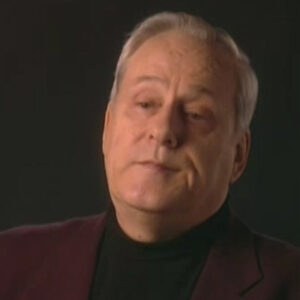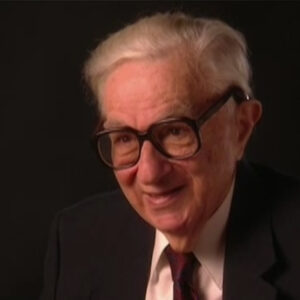Speaker You start your book with something that I actually don’t know if I’m able to use it, but I find interesting is that you talked about it like you talk about learning in numbers and the serendipity of the calendar in this life.
Speaker The serendipity of the calendar and Lenny’s life is something that I never really understood, although the coincidences are simply remarkable. When you look back over the events that were seminal in his career, I think that that these points of departure, if you will, in terms of his his activity, he was extremely conscious of them. And and I’m not basically very superstitious so that I used to appreciate the fact that there were certain dates that were special for all kinds of reasons. But it wasn’t really until his his death that I began to look at this and think this is really, you know, extraordinary how these dates all fall into place over over the years. I never talked to him about it. But there was one incident that happened shortly after we began working together on making the film library, when we didn’t find any company in America that was interested in this and and signed a contract with the Unitel and in Munich. And I hadn’t traveled with him until at any extensive way. I hadn’t traveled with him until. We began this alarming thing and one night in Vienna at a concert which was to be filmed at the intermission of the concert, he was drenched in perspiration, as usual. And so I helped him, you know, with the shirt. And I put the cufflinks down while I was, you know, and so he put the shirt on and was going like this and then said. Where are the cufflinks? And I said, oh, well, I think they’re over here, you think they’re over there?
Speaker Those are koussevitzky cufflinks. I never go on without them. You should know that. And I said, yes, yes. Right. And then I was looking desperately as to where I had put them and I had put them in my pocket, thank God. So I was able to pull them out and and I gave them to him. And immediately he put them together with the shirt cuffs. And as he went out on stage for the second half of the concert, I thought to myself, you just had the closest call imaginable, because if anything could happen to those conflicts, he would never have conducted again. But in fact, you asked about the coincidental dates. I think I think that they were somehow signposts to him and signposts in a way that that was extremely important. And the fact that he actually died within the framework of these particular dates was a kind of final statement. But I didn’t pay that much attention to them. However, over the years, I began to realize that there were certain coincidences.
Speaker Could you just reiterate those particularly that you have reported?
Speaker Well, November 14th, of course, in 1943 was his debut, the New York Philharmonic. And as I’m sure you know, the story of that, having had a pleasant, wild partying night before, gets a telephone call from Bruno Serato that he’s going to conduct Sunday afternoon because Bruno Walter was down with the flu. And if you think about that, it’s it’s rather like a bad novel. I mean, he has a hangover. He is trying to sort of pull himself together. And then he’s awakened to be told that he had woken up at 11:00 in the morning to be told that at 3:00 in the afternoon he’s going to, you know, do the same program that Bruno Valhall with his flew all over the place and, you know, wrapped in blankets and holding on to hot compresses and hot water bottles was indeed going to see him in order to be able to go over the scores and his going up to the Stanhope Hotel and this distinguished old gentleman sitting there shivering, but pointing out everything that needed to be pointed out and then walking out on the stage, which, as you know, was broadcast across the country and ends up on the front page of The New York Times.
Speaker And if that isn’t a launch pad, I don’t know what one is. But if you think about it. It is like a novel. I mean, you know, he’d had he’d been out the night before. I think that he’d been a concert where some of his music was being played in a party after the concert and got back to his studio bedroom in Carnegie Hall to be awakened for him at the crack of dawn 11 o’clock in the morning. It’s not really the crack of dawn, but for Leonard Bernstein, it was the crack of dawn, only to find that he was going to make his national debut at three o’clock that afternoon.
Speaker New York Times. I think in those days, that is one of the best variations on one of the oldest stories in the world overnight. Exactly what else happened in November?
Speaker Well, November 14th, if I remember correctly, was also the first of his omnibus television series. And, of course, that was as important as his Philharmonic debut as his national debut. It wasn’t a doctor because one of the things that Leonard Bernstein did and no other artist in existence has been able to do it was by that November 14th telecast, he took television into his pocket. He was the only artist who was able to make television a commanding instrument in his own lexicon. Leonard Bernstein could look at you through a television set. And you just he was talking to you when he stood on the the the floor the stage floor of the studio that had on it painted on it the first page of the orchestral score of the first movement of Beethoven’s Fifth Symphony, and stood there as the camera went down, while he put his foot on the opening phrases and said three G’s and an E flat baby simple. And then proceeds to tell the story of the evolution of the first movement of the Fifth Symphony in Beethoven. I remember seeing that. I remember sitting at home absolutely mesmerized because that man could look at the television camera and be going this way, because what he did from that moment on television straight through his entire life was to use television as his teaching medium because basically Leonard Bernstein was a teacher and his medium was music.
Speaker And he wanted to touch you. He wanted to move you. He wanted to grab you by the lapels. He wanted you to share his excitement. And that’s what got to me about Leonard Bernstein. The first time I met him, there was this small man. I mean, people don’t realize that Bernstein wasn’t very tall. In fact, he was he was slight and slight build. But he could look at you. He could shake your hand or look you in the eye. He could say anything. And you just were captured. Captured. Some people didn’t like it at all because some people don’t like to be captured and don’t want to have the kind of close feeling of communication. But there were they got fewer and fewer as time went on because he had this seductive quality that was resounding in the way that it touched people. And when you think of what he accomplished in terms of making the world recognize that vigor and energy and passion and excitement of American artists more than anything else, he was responsible for post-World War Two legitimacy of American artists. He was you think back in there after the First World War when you know them, Hemingway’s and the writers that went to Paris and were sort of the colony of expatriates creating a kind of literary work that was American but sort of removed. Other than that, there wasn’t all that much world respect for American artists. I mean, we were looked at as a country, as Calvin Coolidge said, and business of America is business. And therefore, there wasn’t sort of a general feeling that we had anything original to say.
Speaker Actually, Europeans began to listen to American music, jazz music during the First World War, when, in fact Negro soldiers, black soldiers brought their own music with them, and there’s these rhythms began to be began to be exciting to people outside of the United States. Anyway, you had this period between the wars where American artists were, you know, if they weren’t in the movies, they just they weren’t real. And then you have the post-World War Two and this rocket burst on the scene, which was the kinetic, extraordinarily talented energy of Leonard Bernstein and those November dates, which do sound like something out of a novel. I mean, November 14th, 1943, and the November 14th that began the omnibus series on television ending November 14th, which has been very good.
Speaker Oh, yes. Well, that that’s I’d forgotten that, but that’s right. November 14th also was a day in which he met Aaron Copland while while he was at Harvard, Harvard College. I think the the serendipity of those 14 years is kind of nice. And it makes it makes for a. Pattern of Bernstine behavior of Bernstine landmarks, that is curious, as I said originally, I thought it was nice, but I didn’t really pay much attention to it. But he did very strongly.
Speaker Did it. Did you feel. I don’t know anything about this, but did he feel that that these were, in fact, the kind of thing a situation going on in that?
Speaker How do you ever think seriously, how did he view those dates in terms of his own experiences? I really don’t know, because I never I never dwelled on them. He wasn’t superstitious, but he was very cautious about about events and things and but I never spent much time talking to him about it. However, it was. It was. And and toward the end of his life, of course, the same thing reared up again those days. Let’s just go back to the beginning of your relationship with lady.
Speaker And try to summarize briefly as possible that this you just got on the job was to make sure it’s so, so and and with the detail of of what he wants.
Speaker OK, why don’t you why don’t I. Let me. Let me. The first time I met Leonard Bernstein was very quickly in 1954 when he came in to talk to Arthur Judson, who was then his manager, and I was working at Columbia Artist Management at the time. And I remember being summoned into Mr. Judson’s office and meeting him and being extremely impressed by this energy that was sort of contained and hoping that one day we might work together.
Speaker And in fact, in 1959, when I went to Columbia Records and became head of the Masterworks Department Columbia, the first person I worked with was Leonard Bernstein. And at a very odd moment, he’d become music director of the New York Philharmonic. The year before, in 1958, he’d taken the orchestra off on a big European tour. He was due back in Washington in early September, I believe it was, and Columbia’s contract with Leonard Bernstein had expired. And every record company in the world, most especially RCA Victor, was after him. And so my mission as given to me by the late and wonderful Goddard Lieberson was go take care of Lenny and make sure we don’t have any problem. I went down to Washington when the orchestra came back from its tour and was there in prior to the greeting party.
Speaker And of course, when I saw him come off the airplane, this bundle of energy dress, I remember in a blazer with a scarf around his neck and his beautiful wife just walking in front of him. And I was taken to meet him and he said, ride with me to the hotel because I have to talk to you. And I said, oh, absolutely. So I get in the car and he turns around and says, no, I don’t want anybody telling me what I can or cannot record. I said, yes, I understand that, he said. And I want to record the Shostakovich Fifth Symphony before we open our season in New York. And I said, OK. He said, I want to record in Boston in Symphony Hall. And I said, Mr. Bernstein. I said, Lenny said, Lenny Symphony Hall. Well, that’s really, you know, Boston Symphony territory and RCA Victor and well, he said, see if you can figure something out and smile very sweetly. And we got to the hotel. I went up to my room and I thought, how am I going to do this? How am I? Then I remembered that Columbia had lent it power bigs to the Boston Symphony to record the Sensata Organ Symphony. So I knew that the BSO owed me one. And I telephoned Todd Perry, Thomas de Perry Junior, who was the manager of the Boston Symphony and a great friend of Lenny’s as well. And I said, Tod, here’s the problem. On September, whatever the date was when the New York Philharmonic and Lenny are in Symphony Hall in Boston, we want to record the Shostakovich Fifth in Symphony Hall. And he laughed and he said, well, you know that. I said, no, no, Todd, I don’t know, because you’ve got apower bigs. And now I want the hall for Leonard Bernstein. And he said, oh, well, I have to. I said, Todd, Todd, just think about it and call me back in the next half hour. And I put the phone down and I didn’t know what was going to happen. Todd called back and he said, you when you can do it. So that was fine. I went to the concert that night, which had the Shostakovich fifth on it at Constitution Hall. It was just total bedlam, magic. Unbelievable. Lenny again said right with me to the party, which I did. And he turned around. He said, Now what what’s happening about recording the symphony? But I said, well, you’re going to record it on whatever the date was in September in Symphony Hall. What he said, I said, yes, you told me you wanted to record in Symphony Hall. So I have arranged that you’re going to record it in Symphony Hall and they oh, this one. Because of that. I told him story quickly and he looked at me and smiled. He put out his hand and said, My name is Leonard Bernstein. I said, my name is Skyla Chapman. And we shook hands and he gave me a kiss and he said, we’re going to be great friends. And that’s what started our relationship. And the recording was made in Symphony Hall, of course, was just marvelous. And we issued it before Christmas of that year and it was a sensation. But then came the matter of his contract and his lawyer, a man named Abe Friedman, who was very careful. And we had several meetings. And I said to him, now what what what do you feel would be said when I have these offers on my desk from Victor and from Angel Records and a whole laundry list of. And but he said Leonard doesn’t like change. So if we can work out a contract that, let’s say, is for 20 years and allows him to record anything he wishes. Well, I think we can have a very nice relationship. So I knew that no artist that I’d ever heard of in the record world had ever had carte blanche on their repertoire except Enrico Caruso. So I went to Goddard Lieberson and I said to him, I’m meeting with Abe Friedman. These are the terms. And God had looked at me and he said, OK. I said, OK. He said, OK. I went back to Friedman and I said, we’ve agreed 20 year contract and he can record anything he wants and then the matter was over. Well, soon as it was signed, we started to talk about recording the Mahler Symphony. Now, you had to remember, this is 1959. Mahler’s music was very rarely played. And the one conductor who played Mahler regularly was Bruno Walter, who was, of course, a protege of Mahler’s and of course, played a major role in Lenny’s own career. Having been the conductor who got sick on November 14, 1943, so that he could make his debut, we had Bruno Walter under contract to Columbia Records. He was then in his 80s and he was doing revisiting some Mahler and doing some that he’d never recorded before. It’s included the Second Symphony. And I stayed on the air there and the first symphony and Bernstein and I started to talk about the Mahler repertoire and sketching out for five years of what we were going to do. So those pieces could be included in the Philharmonic’s regular programs and then recorded afterwards, which was the system that was used in those days. And the first year we had the Mahler first in the Mahler third, I believe, as the two principal pieces. Well, that was all very well until it happened that Bruno Volter was recording the Mahler first, I knew that my colleague John Maclure, who used to who was the producer for Bernstein’s recordings and Bruno Walter’s recordings, had been out in California making this disc. And I thought, well, I don’t know how to cope with two Mahler first symphonies, the first year of Bernstein’s new contract. But let’s see what happens. And John Maclure came back from California, where he had recorded the Bruno Walter version and brought some acetate this into my office and said, you really want to hear this? And so I put it on the phonograph. And out of the speakers came the most beautiful performance of the Mahler first I’d ever heard in my life, and I’d heard a few because Metropolis was also somebody who played smart. But this was just overwhelming. So I thought, what am I going to do about Bernstine? I didn’t know him that well. And so I had no idea what I was going to happen. And I picked up the phone and I said, Lenny, I’ve just been listening to the Bruno Volter recording of Mahler 1st Symphony because he’s just made it out in California. Oh. And he said, what do you think of it? I said, I think it’s the most beautiful performance of this symphony I’ve ever heard. You’re are you serious? He said, Well, I am. He said, well, I didn’t like about his Mahler Ninth particularly, but. But I better have a listen. I said, fine, I wish you would. So I sent the acetates up to his apartment and a couple of days passed and he called me up one afternoon and he was crying and he said, this is the most beautiful performance of this symphony I have ever heard or expect to hear in my life. It is. You’re absolutely right. It is just stupendous, he said. Now we just have to push off my Mahler first. I’ll do it at the end of the cycle. I wouldn’t want anything to interfere with this beautiful performance. And I put the phone down and I realized that not only was this an exciting and vibrant and extraordinary person to work with, but he was also one of great generosity. And he didn’t record the first Mahler until the end of that cycle of the symphonies and let Bruno Vaulters stand as Colombia’s prime example of that piece. He was very generous. He also could be terribly stubborn. He had in his craw that he wanted to record the list forced symphony. Now the list for Symphony to the most devoted music lover is a piece that usually is left to rest in sort of textbooks or groves or some such place. But Lenny had a thing about the Fourth Symphony and he wanted to he was going to perform at any one to record it. And everybody in the company kept saying, oh, you know, nobody’s going to buy it. I mean, I can’t. You dissuade him from it. So I said, I can try, but I don’t think so. So I went to see him on a couple of occasions and I was trying to be diplomatic and suggested that this was not exactly going to be a world shattering event. Yes, I know he loved the peace, but perhaps we could do it later on. I just wonder as a 20 year contract and just keep pushing off some of these things, but not this one. He gave me a lecture on the importance of the work. He was charming about it. He couldn’t have been nicer and he couldn’t have been more stubborn. We were going to do it. Well, as I say, we didn’t know each other that well, so he took the precaution of calling Goddard Lieberson to say that I seem to be murmuring a little protest about recording the list for Symfony. Goddard called me and he said what? I said, got it. You know, don’t worry. He’s got his contract, says he can do anything you want. All I’m trying to do is to push this off as possible and go. It said to me, good luck and put the phone down. So we recorded it was beautiful record and he was pleased with the performance and when we issued it. I think it sold 100 copies, so I’d always had this Symfony thing in the back of the mind and later on when he was recording for Deutsche Grammophon, what do I see? One day? But Dr. Grammophon has just issued a new recording of the list for. So I went to Alison Ames, who was then the Deutche Gramophone woman in New York. I said, Alison, I see you’ve just done the symphony. She said, yes. I said, can you give me an idea how many records you’ve sold? And she looked very serious and looked at me and said, well, how many did you sell? Oh, that’s simple. I said, 100. How many did you sell? 2000, she said, so I said, well, it’s a it’s a monument to list in the first symphony that Leonard Bernstein’s total record sales of the symphony was 3200 records. And I’m sure that some other cadets will come along. But it was it was just a piece that he wanted to do and a total disaster as far as the public was concerned.
Speaker In fact, though, and I don’t quite remember the statistic, but. In the sales of classical music, having went through some amazing jump, oh, yes, oh yes, no, no question about it.
Speaker And when Bernstein began. Yes, but I mean, it started with David Oppenheim and but it really and I was on the right watch because when he became music director of the Philharmonic, he also was doing television and he was doing for us the omnibus series and the Lincoln Mercury thing and then, of course, the young people’s concerts. So in a sense, Leonard Bernstein was, by virtue of television, his own sales force. Because, as I said earlier, the important thing to remember about Leonard Bernstein in television is he tucked the medium in his pocket. I mean, he could use it as well, better than anybody. You were wanting to look at those young people’s concerts or look at the and the omnibus series and know that you had somebody who was just determined that he was going to convince his audience of the beauty of what he was doing, of the clarity of why he loved it, a love that he wanted to share.
Speaker Essentially, Bernstein was his own salesman because he had this incredible ability to use television as as a communications medium. This was where he, in fact, was at his most compelling.
Speaker And so being on the television regularly between the omnibus series and the young people’s concerts, the audience knew who Leonard Bernstein was and got the sense of excitement and communication that was part of his makeup.
Speaker But there was no question that his entry into the recording field as the conductor of the New York Philharmonic, which gave him opportunities to record a lot of repertoire and a variety of repertoire. One of my favorite bits of recording business with him was the one of the best selling records in his catalog and still one of the best selling records, which is the symphonic suite from West Side Story on one side and suite of music for On the Waterfront on the other. And there was a very amusing story about that because that was prepared as a surprise for his birthday. And I think it was Tommy Shipper’s who was conducting the New York Philharmonic when this was first performed. And Lenny was delighted with it. And he said to me, you know, I really would like to record this now. I said to him, well, OK, but, you know, I always said, you’re always thinking about money and expense. He said there’s nothing really that needs to be done. It’s just it’s beautifully prepared. Just a few little little little changes which I will make when we get in the studio. OK, I said so into the studio. We went John McClure was was producing the record and they started, I think, at 10 o’clock in the morning or something. And by two o’clock in the afternoon I was curious to know what was happening. So I telephoned to John and I said, well, how are they going? He said, Oh, fine, we haven’t recorded a note yet. I said, What? May we start at 10:00? Well, he said, you know, he’s been rehearsing. I said, well, he told me all you want to do was a little patch up. Oh, he said, you should know better than that. So I said, well, we’ve got too much invested now. We just have to go for broke, which we did. And the session lasted all day and well into the night. And when I toted up the figures, it was at that time the most expensive record the company had ever made. So I called Lanny up and I said, well, you have broken a record. Oh, he said, What kind? I said, you made the most expensive record in Colombia’s history. What he said. What do you mean the most expensive record? I said this cost 55000 dollars or whatever. I think it was that man you were talking 1960 or 61. So it’s you know, that was a lot of money. And he said, oh, my God. And I said, what? You just told me, you don’t want to touch up a little here and there when in point of fact, you spent most of the day rehearsing and it wasn’t nothing more to say about it. So I switched to another subject and hung up. In about an hour later, he called me back. He said, I’ve been thinking about that. I tell you what, when you release that record and don’t pay me any royalties until the cost has been made up. I said he was serious about that. He said, yes, I really am a little ashamed. I mean, this was this was I had no idea it was going to be like this. I said, well, let’s after we release the record, we’ll, you know, we’ll talk about it. And I thought, OK, that’s, you know, one way of being able to justify this huge sum. Well, the record came out. Of course, it took off the best selling charts and the whole question of its cost was thoroughly academic, didn’t mean anything because it it was one and still is one of the most successful recordings ever made.
Speaker He was. He was not really exaggerating about the works he wanted to do. He was very smart about repertoire, the exceptions being the occasional list for symphony and the expense of the On the waterfront and the findings with West Side Story. But he was pretty good about it.
Speaker This is jumping ahead, but it’s appropriate for this subject.
Speaker When I when he was very smart about business, I gathered but, you know, hiring the people running for because he really didn’t want to deal with it. That’s right. We did not. And is it true?
Speaker I read a couple of places that’s been told yet he never attended a single meeting of ours.
Speaker And as far as the business side of Andersen was concerned, I think it’s totally true. He did not attend Amerson business meetings here.
Speaker In point of fact, had he was very smart on business matters, very instinctively smart about them, but he hated them and he would ask questions, but he never wanted to sit around and hear any discussion for the large a large part of his career from nineteen seventy six until his death, Harry Kraut and I were the sole trustees of his entire estate, his entire book there anything to do with business. And I said to him once, don’t you realize that you’ve entrusted the two of us with everything you own? I mean, I could run off to Hawaii or to Fiji or someplace or other. And he laughed and he said, yes, but you won’t. And I said, no, we won’t. And there were times when when his astuteness about about professional business matters was I was very keen. He wasn’t interested in the dollars and cents, but he was interested in making certain that whatever was going on was going to be fair in terms of his his equity in in, you know, all the work that he did. He had very good people. Robert Lance, his agent, was the best in the business. Abe Friedman, his lawyer, who was absolutely first class. And when Abe died, when Paul Epstein came on the scene, it was nothing but first class people. But he really didn’t like anything to do with it. I’ll tell you a story about that, because it’s really quite interesting when.
Speaker Leonard Bernstein and Felicia Bernstein’s children were young. My first wife, my late wife and I were the guardians for those children, if they were if the Bernstein’s were killed in a common accident, they came to us and asked us if we would take this responsibility. And we had a slew of children of our own said, absolutely, of course, we would do that. And so we were. And as a consequence, I was sort of the, quote, family person, unquote, in terms of his business affairs at the time that his daughter Jamie was getting married. He wanted to and wanted and did help her with the purchase of an apartment here. And there was a certain amount of money involved in it and that was fine. And we were talking about it to trustees together. And I said, fine, you have to put that same amount of money aside for the other children. And it’s sort of a question of why that, you know, that unmarried.
Speaker I said, but that’s beside the point. I mean, if you have children, you treat each one properly. Otherwise, that’s what causes families to, you know, fall apart. And so there was a trust document drawn up that I didn’t quite like. And I went through two or three versions and finally signed it and everything was fine. And I was telling Lanny this story about just as a sort of offhand observation of his of his way of doing business. And he leaned over and patted me on the cheek and said, Why do you think you’re there? He wanted somebody who was going to be more concerned about the family than perhaps others who had no particular family connection might be. And that is not to imply anything at all. It’s just that Bernstine knew who the people were that he wanted to trust and where they particularly fit into his life. And that was a very smart thing for him to do. As a result, there never were any real problems. There were there were opportunities that one or another of us would perhaps know more about than the next one. But he once said that when Harry Croute and I agreed on something and he never gave it a second thought, Harry and I used to discuss a lot on quite a number of things. But if we came to a resolution where the two of us felt that this and this should be done, you never thought about it either because you were there.
Speaker I think it was the famous when this had happened.
Speaker And I was saying, well, I can only describe that. I can only describe to you the Glenn Gould and Leonard Bernstein had a wonderful relationship. They they respected, admired and liked each other. And I think Glen was actually a little in love with Felicia Bernstein. I mean, almost everybody was she was one of the most beautiful and attractive and vivacious people imaginable. But when they first met and Glenn Gould was was I think the correct word is eccentric and his eccentricities were mostly about heat and cold. So overcoats and gloves and caps and mittens were the order of the day, even if it was perhaps 75 to 80 degrees outside.
Speaker And Felicia, once when they first met, took a look at him and said, you know, you really are a raggamuffin. And she gave him a trimmed his hair and and gave him a shampoo. And, you know, everything from that moment on, Glenn, I looked on Felicia Bernstine as his barber. They also, of course, agreed on musical matters, except when it came to this Brahms D minor concerto, which he was to perform. And Bernstein decided that he would he disagreed totally with what Glenn wanted to do. But he also respected ghoul’s ideas sufficiently so that he came out and made a little curtain speech before the performance in which he told the audience that he and Glenn Gould did not agree about the way this piece should be played, but that Glenn Gould was an artist of major importance. Therefore, he was going to conduct the piece the way that Glenn wanted, even though he didn’t really agree with it. Well, we didn’t really. This, obviously, but it was, in fact, broadcast on one of the Philharmonic broadcasts, and only about two years ago the Philharmonic took that and used it as a premium record in one of their fundraising campaigns. And in point of fact, if you listen to that record and compare the average time of performer on that piece, Glenns total time lag was two and a half minutes. So it but it is eccentric if you listen to it. Glenn’s feeling about inner voices and all that come through. I don’t think anybody else would that I know I would play the concerto that way, but it was perfectly legitimate and it did not do anything but strengthen the friendship between those two extraordinary artists and then make friends always right up until the day that Glenn Gould died.
Speaker Let’s move on to when you went to Israel and many years later in 1989.
Speaker That’s not quite there yet. Let’s come back to when I guess you then left Columbia Records and what I don’t remember quite the time between that is going to run.
Speaker Oh, it was four years. I started to run Amberson in in 1969, eight and nine, the year that Lenny left the New York Philharmonic.
Speaker He came to me. I was then at Lincoln Center and I was in charge of programming. And most of the programming activities at Lincoln Center Inc was doing were abandoned because of fiscal problems. The only remaining thing really was the New York Film Festival, which I was sort of in charge of, but not really running it. And I my contract with Lincoln Center was up. And then he called me and said my contract with the Philharmonic is up. Lincoln Center, your contract with Lincoln Center is up. Why don’t we do some work together? And I said, that’s a lovely idea. I said, well, I’ve had a letter from Robbie Lantz, his manager, proposing some ideas and why don’t you come over and we’ll talk about it. So I went over to meet him. We had spent an afternoon together. And basically what Lance had proposed was that from that point on, anything that Leonard Bernstein did in the way of performance should be recorded and filmed, that there was obviously going to be a video cassette market, although in 1968 it was just a dream and that Bernstein should be prepared for this and should have his own production company. And all this was a very sensible program. And so he then asked me to come in to and to get this organized and to and to run it. Well, the first thing we tried to do, of course, was find an American company that would be interested in doing it. Forget it. Nobody was interested. The video cassette market was looked at as something, you know, pie in the sky for the next millennium.
Speaker And anyway, the material that would be coming out of the work of Leonard Bernstein was not of interest. I remember the most absurd conversation I’ve ever had professionally with the then president of Columbia Records who tried to persuade Lenny to change his entire repertoire habits and to get into the modern pop culture in a way that bringing his prestige and modern pop music together would create a huge market. Everybody would get very rich. I remember Lenny being excessively polite at that dinner, which usually which meant indeed that as soon as that person walked out the door, there was an explosion. When Lenny exploded, he was really rather like Vesuvius must have been.
Speaker Anyway, we found a company in Germany in Munich, Unitel, or I should say Unitel, in a sense, found us, because when I first began to work with him at Andersen, he had he was going to record the Verdi Requiem in London. And we thought it would be a lovely idea to start the film business by recording that Verdi Requiem. So there wasn’t really time to get into the long range. I needed to get started. We need to get started quickly. And went to Roger Stevens and.
Speaker And Bob Whitehead, who. Had long been sportsground and produced West Side Story and said, look, we have an opportunity to make a film of the Verdi Requiem in London with Lenny and the London Symphony and similar course in St. Paul’s Cathedral with Martina Arroyo and Franco Carelli and Dissanayake. And how about you are joining us, production venture, you put up the money and we’ll make them we’ll make the show and I’m free. Burton was to direct it and Humphrey came over and we figured out a budget that was, if I recall correctly, about 88000 dollars.
Speaker I mean, you couldn’t berp for eighty eight thousand dollars these days. But anyway, Oliver Smith, the late Oliver Smith, who was a part of all this and was an architecture student in his days as an architecture student, had studied St. Paul’s Cathedral. And I remember the first day that we were getting ready to do this filming sound project. There were I came to St. Paul’s Cathedral, London. There were more cables and electric boxes and stuff on the sidewalk outside St. Paul’s than I’d ever seen. And Oliver was standing inside the entrance with an overcoat over his shoulders and his arms akimbo like this. And I went to him and I said, Oliver, what is all this stuff? And he said, Every light that is not in use on the west end of London is here now. I said, why? Because we were joint producers. This he said, because I know this building and I know that up there, pointing up in the ceiling are some of the most beautiful frescoes that nobody ever sees. And we’re going to light every one of them. And the camera is going to see these frescoes. So, OK, we, in fact, did this project and it was the first of The Ambersons film record projects. And it went on until four o’clock in the morning and we were all dropping dead with exhaustion. And the next day we were going to look at the tapes at a studio in Dean Street in London. And I was absolutely certain that it was a disaster. I mean, I was just certain that it was a disaster. And we got in the screening room and the unedited tape started coming up on the monitors and they were just stunning, stunning the performances, the the whole thing. Obviously, a lot of work had to be done to put it together, but the pieces were just extraordinary. And I remember there was dead silence in the screening room. All you could hear were people sniffling. And I thought there might be a lot of maybe it’s an early London English cold. It wasn’t at all. They were crying and somebody had six Kleenexes and were passing them around him. It was so beautiful that he, of course, wasn’t there. But I rooted him out of bed at 12 noon or something and said to him, we’ve just been our audience is really just beautiful and you will like it. And in fact, you know, he did it was the first one. Well, now to do that, we had to make a deal with the English Musicians Union because we had to do this and have the rights for showing on television. And a very and Humphrey got in touch with with the lawyers for London Weekend Television. And I didn’t know whether we were going to get anything, but we did. We made a deal, as they say, with the English unions that allowed this to happen. It was the first. It was the first Bernstine project with these rights tacked onto the basic pay scale that we paid the extra. So we were off and running. But after that, you know, it was not a question of being able to find anybody that believed that this would have a market and go back for a minute, because I think you need to tell us the fact that place.
Speaker Oh, oh, yes. Yes. I’m going to be saying yes, right? Oh, yes.
Speaker I’ll back up to speak about, you know, the cast we had we had the cast originally was Martina Arroyo, Josephine v.C, Franco Correlli and and and Raymonde is the bass baritone. And when Franco Carelli arrived in London and started to rehearse with with Lenny, he sounded awful. He was sort of bleeding and he was rehearsing in one of the rooms and Burnstone suite at the Savoy Hotel. And I was having a cup of tea with Felicia. And you could hear this, these odd sounds coming out of the living room. And finally, Carelli left. And I said something, Lenny, about what he said. I don’t know. It’s very peculiar the way it was. Certainly we had a rehearsal that night and it was. Was not good. Now, before we had left New York for London, having known Mr Corelli’s proclivities for disappearing at moments of performance, I called Placido Domingo and asked if I could talk to him about standing by for this film.
Speaker And we met at the Plaza Hotel. He and his wife and his then agent and I explained what we were doing and it was Bernstine and it was London and Symphony and St Paul’s Cathedral and film for television, the rest of it. But I wanted to know whether I could engage him as a standby in case Correlli decided he wasn’t going to sing. And Placido looked at me and he said, You know, I have been doing this for Correlli now for some time. I’m always on this. I think I think I, I don’t think so. But I said because it is Maestro Bernstein and because it is the Requiem and in London and under these circumstances, I will agree. And we agreed upon an appropriate fee. And he said, but you must let me know. On whatever this Saturday, because I have a Saturday matinee performance at the Metropolitan and then I would fly and it would be available on that Tuesday. I think it was when the first performance, but I must know on Saturday. So I said, fine, if you don’t call me on Saturday, we have no I said understand. So it was Friday night when the first rehearsal with Correlli and it was obvious that this wasn’t going to work. So I’m leaving early in the morning in bed thinking to myself, it’s not going to work and I’m going to call Loretta Carelli. And simply, I have to say, this is, I think, probably not going to work. Phone rang about seven thirty in the morning and there was Loretta Correlli. She’s calling me and she’s Franco had sung with Bernstein at the Metropolitan Opera. And because in Cavalleria Rusticana a couple of weeks, a couple of months before, so they had worked together. And Loretta Karalis said that Franco was sick and that they were sorry they were canceling and they were going back to Italy. So I said, oh, you’re canceling? Yes, we’re canceling. I said, well, I’m I’m so sorry. And the maestro will be very sorry to thank you so much for calling me. Oh, send your shopping. I will see it. I said, fine, thank you so much. The runner up breathed the biggest sigh of relief I could possibly breathe. And at the appropriate time, put a call in to Placidyl and said, Carelli is canceled, please come, he said, Good, I want to I want a first class air ticket and appropriate suite at that. And I said everything will be done. And Placidyl came. And it was the first time he’d worked with Bernstine and it was just magic.
Speaker One more story about the we’re going to change into this very, very quickly, because it’s an aside, it’s kind of cute, and that’s Dean.
Speaker Oh, yes. At St. Paul’s Cathedral, when we were doing the very requiem, Bernstine, of course, was a chain smoker and there was no smoking allowed in any place anywhere and in St. Paul’s. And when we took Branson back to the room that he was to use as a sort of changing room, he wanted to smoke. And I said, no, you can’t do that. And we tried to figure out how to, you know, blow smoke through some hole in the wall or through the bathroom or something. But he was just absolutely desperate. And I asked the dean of the cathedral about this and the dean said in a very hot here way, there is no smoking in this cathedral. And I said, I really am not interested in Mr. Bernstein’s problems. There are no there’s no smoking. So we do the performance and the dean comes back to his dressing area and the dean is quite shaken by the beauty of what he’s seen. And Bernstine is desperate for a cigarette. So he looks at the dean and says, oh, may I smoke? And the dean reaches in his clerical coat, pulls out some cigarettes and says, Mr. Bernstein, after what you’ve done tonight, smoke as much as you want.
Speaker Now, let’s talk about the signing of the.
Speaker Yes, when we couldn’t find an American company on various trips, there was always somebody there from this company, Unitel in Munich, who would turn up everywhere. And it was obvious that they wanted to sign Bernstine for an exclusive contract to make video videos and. Finally, one day I said to this guy, it was in Tokyo, I remember very well, I said I’d have breakfast with him and he said, we want him you to tell me, OK, etc.. So we got back to New York and I got a hold of a Friedman. And I said, this seems to be serious. We ought to try to see what we can do with this German company. And Abe Friedman looked at me and said, German company. I said, yes, they have, but they have been. Let’s explore it. And so we negotiated with them. And Friedman did a very good deal and everyone was ready to go. I kept Lenny advised that we were doing this. But finally, when it was done, I went up to him with a contract to sign and I said in the original contract was for the fire, Brahms symphonies, the nine marketplace. And he put it on his desk and he looked at it and he said, Are you really asking me to sign a contract with a German company? And I said, Yes, I am. I said, Lenny, the war is over. And you’ve been to Austria and you’ve been to Germany. And this is a company that seems to want to do the kind of artistic work that you are interested in, saying you will not be sorry. And he looked at me and signed it and gave them back and he said, I hope you’re right.
Speaker I was told that they’re hoping that they have the centennial bicentennial season. I said the second I made that mistake, but I think the stories have to be a little bit shorter. And because I really wanted to use it. I mean, it’s just beginning with, you know what I’ve been thinking about the centennial and coming up called Bill Paley and said, what are you planning to do about his birthday and how went?
Speaker OK, I’ll try to make it as brief as I can. The story about the creation of the program for CBS television celebrating the two 100th birthday of Beethoven began with a conversation that Lenny and I had where I said, I think the only way that we’re going to get anywhere with CBS is if you call Bill Paley. And he said, but I don’t like doing that. I said, fine, I know you don’t like doing it, but in this time, if we want to do it, this is the way to go.
Speaker So we picked up the phone, had an absolutely charming conversation with Bill Paley, called me after he’d done it. And he said I said to him that my people were going to bring to your people an outline of a problematic idea. And we put together the basic idea with Humphrey Burton and I went to CBS television and gave it to the then sort of high panjandrums like Dan, who looked at it and said, well, this is it. I said, look, Bernstine is just talk to Paley about this and he seems interested. And so in a remarkably short time, an agreement was made that we would do this 90 minute special on Beethoven’s bicentenary. And we then sought out partner and we had one big partner in the Austrian state radio and television station, Woodfork. It’s one of the few German phrases I can use and say and and we began. Now, the program itself was badly treated in America because it was finished on time, even a little bit under budget delivered to CBS who were ecstatic about it, and then they didn’t put it on for a year. So instead of celebrating the bicentenary of celebrated bicentenary plus one everywhere else in the world, it was shown and it was it was a huge success and it was a very nice success when it was shown over here. But but it should have been done at the time that it was contracted for and just was an indication of how uninterested American television was in such a such program. But to CBS credit, they at least did it and supported it. And even if they put it on a year later, the one moment in that program that I think is probably the most unforgettable is a minute and a half or two minutes at the most. A little essay that Bernstein does at the end about why Beethoven is important. And he originally wrote this essay and did it. And when he was through with it, he looked at Humphrey Burton, who was directing the show and myself producing it and said, well, and both of us said, that’s OK, but it’s really not very good. And he got a little cranky on the subject and sort of grabbed the paper and went upstairs because we filmed it in the house. He’d read it and grinned signals out of Vienna and slammed the door and a half hour later came back with foolscap, yellow legal stuff, slapped it on the piano music bench and said, OK, I’m ready. So the cameras turn. And then out came this minute and a half in which he described the importance of Beethoven and in five words. The ones that have always remembered, he described Beethoven’s music as Beethoven’s music is accessible without being ordinary, and you find a better description of Beethoven than that, accessible without being ordinary. The whole essay was packed with this so that when it led to the performance climax of the show, which was the last movement of the Ninth Symphony, it led with these extraordinary words that Bernstein had about the importance of Beethoven as probably the most important composer that ever lived.
Speaker Steven Spielberg and I went upstairs and half an hour later, yes, he came down within a half an hour later, which was I think he knew perfectly well that the first piece he just dashed off and hadn’t really given it much thought. He didn’t like being reminded that it wasn’t up to his best and got rather testy about it. But then he went off and 30 minutes came back with that verbal essay that those who heard it will never forget.
Speaker I think if one were you there, I know you referred to it in the street about the rivalry with Korea and oh yes, well, I actually never saw the two conductors together.
Speaker But I do I do think that I don’t believe that Bernstine harbored any really serious displeasure with carry on. I think that carry on was very ticked off by Bernstine. I think carry on felt probably that Bernstine was the only basic competitor that he had. They were both glamorous figures. They were both extremely effective at what they did. They both had the charisma that the public loved, but they were two totally different people. I knew Kerrianne fairly well. And the old cliche about oil and water was totally true. But Bernstine never seemed to be that irritated and carry on, always seem to be irritated.
Speaker I don’t really think I can add much more to that Harry crowd, undoubtedly can give you a little story where it’s somebody said something to him to let me, I guess, say, well, you’re 10 years younger than he is, more than half inch taller or something like that. I don’t know my story if you can do this one again shortly. It’s it’s I don’t know. I don’t have time to get into it was actually I love the story about about Gottliebsen.
Speaker Think everybody calling him God.
Speaker Oh yeah. That’s right.
Speaker And then you could tell that because there’s something very interesting because he really left all these decisions to you. Yeah. Which I think was.
Speaker Side of a great executive, but the one time that you did ask about it and it was about balance and I think you said it must be done. Oh.
Speaker Yes, for the next generation. That’s right, that’s exactly what I mean. I started by saying I’ve been calling God. Yes, everybody called him God and I’m referring to Goddard Lieberson, who was the charismatic and extraordinary president of Columbia Records. During my years as head of the Masterworks Department, Lieberson was an extremely handsome, very bright, very funny renaissance man. I mean, he he wrote a novel, three, four bedroom two, which was made into a movie. And he was a composer. He was all of those things. It was also very good executive. And he asked me once. In a sort of questioning way, because basically he left the operations of the Masterworks Department to me during my time there, he was a very good manager and if he didn’t like something, he would call up and we would have some words about it. But basically, it was supposed to I was, you know, to run it. And when he saw that we were going to be doing all the Beethoven symphonies, we were walking home one afternoon and I said to him, we were doing he said, why are we doing the Winsley only doing all of Beethoven? All the Beethoven said, please. I mean, we really don’t need that. We have the number in a vault. We have Eugene Ormandy, we have George Howell. We have a brother. I said, well. I know what you mean, but think of it this way every generation is going to have the conductor who is going to put a definitive mark on those extraordinary works. And this generation’s master for that is Bernstine. And we must do this because this is the Beethoven that will appeal to and become a part of younger people’s love of this music. And Lieberson didn’t say anything, say anything for a moment or two, and then turned around, looked at me and he said, you’re right.
Speaker I’m just. Say this because I don’t to talk about serendipity days. Just jumping ahead here that you met, lady and the lady died 31 years later to the day.
Speaker Yes, the serendipitous business that Bernstine had about dates are. Which included and of course, November 14 is a key date. The day that he died. I looked and realized that it was exactly 31 years to the day in which I had met him. There was something very spooky about that. As if there was a real chapter closing. I got the news of his death on an airplane, I was flying to Hamburg on some business and. The plane took off. And about a couple of hours into the into the flight, I was surprised by a steward who came up to me and said, Mr. Chapman. Yes, well, when we get to Zurich, you are to call your wife. And he left and I thought, my wife. But something wrong? I mean, something I got we got to see her again. This was a private person and he sort of separate met me and took me to the phone and I called and it was indeed my wife to tell me that Lenny had died. And that she tried to reach me at the airport before the plane took off from the rest of it and I. Spoke with her for a few minutes, and it was a very early in the morning and there was a lone woman sitting sort of at a desk in the telephone post office area. And I came out of the telephone booth and. I must have looked awful because she turned to me and said, Sir. Are you all right? And I said, yes, but. But that phone call was to tell me that Leonard Bernstein had died. This woman looked at me and said, Bernstine has died. I put her hand over her mouth and started to cry and I walked away from and there was practically nobody in me in that area. And I look back and here was this totally strange woman whom I had given this information and whose immediate reaction was, oh, no, it’s not possible. It was what happened everywhere.
Speaker When that news came, you had some premonition of this. Oh, I certainly did.
Speaker The 1989 trip to Israel, which I made when he asked me if I was free to go with him and I hadn’t seen him in several months. And when we rendezvous to make the trip, I looked at him and I thought, oh, this man doesn’t look well. So I asked him how he was and he said, finally, I actually have a cough. And it was bothering him and he was tired. But then with the usual Bernstine complaints. Which initially I didn’t pay much attention to, but on the way to Israel from we went to London first and I would hear this this terrible, terrible coughing. And he always coughed. But but there was something something wrong on the plane to Israel. When we started, he started telling me about who I was going to meet and that this was going to be an extremely interesting time. And he knew I’d never been to Israel and immediately became the teacher. And he said, we’ve got to meet this person and that person watching me tell a colleague, I want you to meet so-and-so. And it was laying all this on and and then became Burnside.
Speaker But when we got to Tel Aviv and five 45 in the morning and the Israel Philharmonic people were there and we drove to the Hilton Hotel and there was a guy who was sitting up front who was not driving this particular car, but was Lenny’s driver, a sergeant in the Israeli army and everything. Baggage was sent upstairs and everything was there. And I was in the lobby of the hotel and this guy came down and sat down with me and he said, So what is wrong with Bernstine? I said, nothing. He’s just tired. And, you know, he said, there’s something more. There is something more. He is not well.
Speaker And I said, well, I agree with you, but I. I don’t know. During the course of the visit, it was obvious that something was very wrong. And one night I, I had been having supper with him after a performance. And when I left the room, I could hear him start to cough. And I had a key to his suite. And about an hour later, I went back and and he was in bed and the coughing was just impossible. And I went in and I said and he just pointed at a bottle of pills that he wanted, which I gave him and water. And every time I started to say anything, it was, no, no, I’m fine, no, no, I’m fine. But it was it was obvious that he wasn’t. And the. That trip was the first time ever in my experiences with him that he finished a concert and didn’t receive the public, he just before going out for the last piece. He turned around to Cregger, God and myself. He said, look. Let’s go home after the break. I take my last vows. And I remember Craig and I looking at each other thinking what, but I think it might be his last real. I I think so. That trip had a very important moment in it because it happened to mark fiftieth anniversary of the Holocaust and there was a very moving ceremony that the Yad Vashem in Jerusalem with a whole wall full of old people who were Gentiles, who had helped Jews during the war. And we went there with with Teddy Colligan and your sister, who was a painter and a friend of Lenny’s. And Shamir was then the prime minister and colleague was very upset with Shamir speech. And I said to him, look, come and join us for dinner. We’re going to be at the Notre Dame restaurant. And the minute the Israel Philharmonic manager heard the way we were going, he took me aside and he said, don’t go to the Arab section of Jerusalem. This is not the night to do it. Don’t do it. You must persuade Lenny. You must tell him not to beg carrying on about this. So I mentioned it to him and he said, no, we’re going to Notre Dame. He turned to Telecomix. And who was then Mayor Jerusalem? He said, Can you join us in college? I said, I’ll be over there in a little while. I’ll join you for dessert. So we go over and of course, he’s the mayor of Jerusalem. And the night is marking the Holocaust, walking into a restaurant in the Arab section of the city with no bodyguards, by the way. And there was something very much on Teddy’s mind. And what was on his mind was to persuade Lenny to write an opera on the King David story and. The conversation was fascinating, as you might imagine, and but Lenny kept saying no, well, I don’t think so, but I’ll think about it and I have to. Colleague, I’ve been there for about an hour, an hour and a half. The owner of the restaurant came and something in his ear and he had to get up and go and left the place. Had said he would see us on the plane going back because we were going. He had one more concert to do and then we were going back to New York. But I knew I knew that there was something terribly, terribly wrong. And on the trip back to New York. He he got several of these coughing fits that weren’t just there was nothing that you could do to help him, except he did have some medicine of some kind. But when I said goodbye to him after that. And he thanked me for coming and gave me a big hug and I left him off at his apartment. I actually never saw him again.
Speaker So did you put that on that trip home that he began to talk about things in a way that made you feel that he was summing up his life?
Speaker Yes, because he was he was talking about. Events and people and things that he really wanted to do, he spent a lot of time talking about young people and learning a love of learning and how this had never left him. And that one should, with one’s life, explore everything because you learn and by learning you have the experiences that create a real contribution. It was an extraordinary kind of summing up of things that meant a great deal to him. He spoke about his family, of course, he spoke about other things. But basically what he was talking about was the importance of exploring the importance of learning, because that was one of the things that Bernstine had as a as a measure of his entire life.
Speaker He was always learning what to do in a very simple statement when Israel needed.
Speaker Israel, I think, meant to Bernstine the. Historic position of the Jewish people, it meant to him the symbolism of all of the tenants of Judaism, Lenny actually, while he was an observant Jew, when it came to, you know, Passover and to Yom Kippur and all of the appropriate high holidays, Lenny was was curious about religion. I and because I’m a Unitarian, and he used to come occasionally to the Unitarian Church to speak and made one of his most brilliant speeches of on the subject of love at that Unitarian church. But I think Israel was the symbol of the historic past. Lenny had a campaign, a passionate interest in history, and these were the roots from which he came. So it was really a reference to roots and to freedom. I mean, when you realize that Lenny went to Israel the minute it became a but went before, but went as when Israel became a state, he went immediately and he was there at every crucial moment. And it was always his gift to Israel and never to. And I mean, he always conducted for free there. But I think it was his roots. I think it was the symbol and the earth and the people from whom he felt that he was a living descendant. And I think those were very strong with him in various ways.
Speaker And in many ways. I mean, he had wonderful relationships. He seems to have had something really unusual in the Israeli prime minister that he kind of solved and some other like.
Speaker Yes, well, I tell you, fighter three now they did. And, you know, Lenny was also a high romantic. And and it is totally true that the Israel orchestra was this symbol of continuity of art. It was the symbol of of courage. It was a symbol of the fact that life would go on, should go on despite problems. And he was more patient with the Israel Philharmonic than any other orchestra that I ever saw him with. And I did actually see him, of course, rehearse what turned out to be his last concerts with the Israel Philharmonic. And there was a very difficult program. Hindemith, which works at the orchestra, didn’t know and hadn’t prepared. And Michael Barrett did the first rehearsals of these pieces. And I was sitting in the back of the orchestra and I thought to myself, these guys I mean, this is really professional misbehaviour. And I thought, what is going to happen when Bernstein actually gets here and they play as indifferently and as sloppily as they were playing and Bernstein got there and they did play it differently and sloppily and finally and he I could see the look on his face and then it changed and he began to teach them. He taught them about Hindemith. He taught them about these pieces and why they were important. And he did section rehearsals. And I thought to myself, this is like this is like taking a college orchestra and, you know, and piecing it together in order to be able to make a performance only. This is the Israel Philharmonic. So at the break, I went up to him and I said, God, you are patient with this. And he looked at me and he said, don’t ever say that these people have no replacements in 300 miles. They are heroes. They are here. They have given their lives to this country and given their lives to this orchestra. Don’t you ever say anything like that. So, OK, I won’t say anything. And I went back and by the time he got through to rehearsals, he had shaped the performances of works that the orchestra had been very indolent about preparing. And the concert performances were glorious. But he would not do that with just any orchestra. If he came in front of an orchestra. They ought to be prepared to tell you one other orchestra story about Lenny, which which I dearly love, because it’s an illustration that you that it’s an illustration of genius, a word that often gets overused in the preparation of mass. His piece that opened the Kennedy Center, the orchestra musicians were simply recruited from the ranks of musicians in the Washington, D.C. local. There were 60 or 65 players. They were OK. I mean, they were professional musicians playing the music in front of them. But there was one of the orchestral interludes that Lenny was very unhappy with and Maurice Baraza was conducting. He was doing. But but he couldn’t get done. He couldn’t get a point across. So he came running down the aisle of the Kennedy Center. The Opera House leapt into the pit, took up a pencil, and he said, let me show you what I mean.
Speaker And he started to conduct. Well, now I was sitting in the back of the theater with Alvin Ailey, who did the choreography for it.
Speaker And I tell you that in two minutes that orchestra sounded like the Vienna Philharmonic. It was unbelievable. And sound came together. The attention them and Lenny must have been in that pit for five minutes at the most, six minutes. And he stopped and he turned around and handed the pencil to Morris. He said, that’s what I mean, and leapt out of the pit. I turned to Alvin Ailey and I said, oh, my God. I mean, here he is, having had the perfect example. But one little thing that he could never do, which was to leap in there and make that group sound like the Vienna Philharmonic.
Speaker And it was fascinating. It was an illustration of whatever that quality was that Bernstein could put out and people just responded to it. Musicians especially.
Speaker To say a few little things about mass, you talked about this to the stories of Lebanese legendarily having difficulty finishing right. To culminate very much with Mass and because he was doing Rosenkavalier and has chosen to spend the money this to you. That’s right. That’s short.
Speaker Yes. Well, Lenny, when Lenny was composing anything, it was always an agony. And because it was Bernstine, it was a super agony. I mean, it was I couldn’t sleep. I can’t do anything else. I have to get everybody’s music out of my head start getting my own and mass, which was to open the Kennedy Center, kept being put off and put off. Then a little drama occurred. Roger Stevens, who was then the head of the Kennedy Center and who was supervising all of this, had a heart attack and was in the hospital. And Lenny went to see him and they were very good friends. He went to see him.
Speaker And Roger wasn’t supposed to have any visitors. But Lenny pushed people past excuse me, Roger wasn’t supposed to have any visitors, but Lenny just pushed past people and went into his room. And there was Roger Stevens lying with all kinds of things coming out of his arm and tubes and the rest of it and and anxious people standing around looking at him.
Speaker And he saw Lenny come in and Lenny went over to him and said, Oh, Roger, Roger, is there anything I can do for you? And Roger looked up at him and motioned for him to come down lower. And then he put his head to Rochus mouth and Roger said, finish mass.
Speaker I think it was the catalytic agent that got that piece written.
Speaker When I mean as if that I like Easter mass. It was a reception and.
Speaker It certainly was it was a disappointment and it’s one of the few times when I think that Leonard Bernstein made a big mistake.
Speaker We only had one public performance of Mass before the opening. And for that performance, Gordon Davidson, who we had, was doing a brilliant job directing it. And the rest of us were terribly concerned about the fact that it was too long now, not just too long, but too repetitive. And there were things that could be cut that would tighten up the work and would make it an extremely effective piece. And so we won out with Lenny on the one public performance, the one preview performance, and chopped out about 16 or 17 minutes of the piece. And we counted on Felicia and we had not seen it or not been any of the rehearsals on who has extremely good sense of the theater. It was a very good actress, would be enchanted by it in its and its cut version, even though she hadn’t heard the whole piece. So I took her aside and Gordon Davidson took her aside and we said, look, I mean, this is what we’ve done and we think it’s right. So we went and that night there was an invited audience and the piece was devastating. It was so good. I mean, it was just so moving and unbelievable reaction on the audience part. I remember going down to say hello to Bill Sapphire, William Sapphire, who was there with his wife and who turned to me and said, I think the chief ought to see this. And I thought the day that Richard Nixon comes to see the performance of Leonard Bernstein’s music will be something. But that was so that was how gripping it was the next morning when he looked at us and said, well, you’ve all had your fun. The cuts are going out, everything’s going back in. And Felicia was desperately disappointed about this because it was obvious that where it was was was right. So he put the pieces back in and it didn’t work the way it should have worked. And if it hadn’t been for The Washington Post and it’s absolutely ecstatic review of the piece, I think it would very well not have had many performances. And it’s a shame because the version that was done for the one public preview was glorious.
Speaker It is often true with creative people that they cannot see, as the cliche goes, the woods for the trees. And in this case is the only time that I ever saw this with Bernstein because all his other collaborations seemed to be easy. I mean, easy in a broad sense. But but he was not you know, he didn’t hang on to every note, but for this piece, he was just stubborn beyond measure. And the piece was not as successful as it should be.
Speaker What’s the story about Nixon believing that there was some subtext in Lenny’s enmasse that was going to be pointed at him?
Speaker No, I that’s I don’t I don’t know about that. And therefore, wouldn’t I? Well, he didn’t attend, but Nixon and you know, Bernstine I.
Speaker Your statement. Yes, that’s right. I guess he saw it as I think so.
Speaker But I don’t think I mean, I was just so surprised. Bill Safire was then is one of his speechwriters. And I and Bill was so taken with the piece that that he was he said the chief ought to see this and but never did that I know of.
Speaker We talked a little bit about some of the personal side of Levy. I know that you and. Marital separation? Yes, with him, they don’t really want to have a lot of children. No, this has got to be a part of the story just because it’s been out there too much and they talk about it from you.
Speaker What did you perceive to be happening during this brief separation?
Speaker Well, that’s a very what did I perceive to be happening when Leonard and Felicia Bernstine split up?
Speaker I described the press conference.
Speaker Well, I actually wasn’t at the press conference, so I can’t describe it.
Speaker But I can I can give you my own feeling about it, which was simply that the no matter what the occasion and what the the accumulation of of inter wife husband relationship, that that separation would not last. Nobody knew, of course, that Felicia was going to become so ill so quickly.
Speaker And and it didn’t last in the sense they did get back together, but. The whole business is really something from the standpoint of Bernstein’s life that was of enormous importance to him, but that’s really a family matter and I don’t want to talk about it.
Speaker You had said something interesting in your book that.
Speaker How many people just got so quickly that landed was, you know, for a musician deeply connected with some of the momentous events of historic events of our time in JFK? All right. That’s on television with Robert Kennedy’s funeral. Jimmy Carter.
Speaker Jimmy Carter. Yes. Yes, you could. Yeah. Put this in context is kind of nice and be specific about the all of the things that we did there with the first lady. Yes.
Speaker Yes. Lenny carried with him, of course, a passionate interest in in political affairs and in current events and carried his feelings into any way that he could. I mean, he was a liberal in the old fashioned sense of that word and believed in equality, believed in the ability of people to live with each other. I mean, he was a he was a Democrat with a small D as well as a Democrat with a large D in terms of his political interests. But he happened at the course of history to participate in a lot of historical events.
Speaker One, of course, was the assassination of John F. Kennedy and the immediate feeling that he should do something. And the invitation came. I remember going up to his apartment the afternoon that we all knew that Kennedy had been assassinated and the phone rang and it was Richard Tucker, the tenor, who wanted Lanny to agree to conduct the Verdi Requiem in a special performance. But at that time, Lanny had never conducted the Verdi Requiem, and he went down to his study and took a look at the score and and realized that, you know, this could not just do this piece. But he then telephoned CBS, I think, and suggested that that Mahler’s Second Symphony would be appropriate to mark this occasion and in fact, did a performance of Mahler’s 2nd Symphony on national television. And I believe it was the night after the Kennedy assassination. And then when Robert Kennedy was killed, he again was asked this time was asked by the Kennedy family to to perform and did the order chateau from the Mahler Fifth Symphony. And one of my one of the most important things I think that he did in terms of a difficult political situation was on President Carter’s trip to Mexico, which, as you may remember, came at a time when Mexican-American relations were a pretty sorry point. Bernstine was down there to conduct the orchestra in Mexico City and at a special concert that had to do with the meeting of the two presidents. And after the formalities were over, he observed that there really wasn’t much sort of rapport between the two of them. So Bernstein, who spoke fluent Spanish, I discovered that Carter spoke Spanish, so got the president of the United States and the president of Mexico to sit down at a table at a reception, and they started singing Mexican folk music. Well, in fact, Carter knew a lot of Mexican folk music and the president of Mexico was astounded that the president of the United States knew anything about this. And so the evening apparently went on for quite some time with these two men now looking at each other and now talking to each other in a different way. They had discovered these bonds of of communication, both in language and in music. And Lenny had just brought them together at a point where he happened to know that there was this common interest of only the two of them could find it. And he was the catalytic agent that found it.
Speaker That’s what I didn’t know that until I read your book.
Speaker Just describe of the part that just right left in the green room after Lenny in the green room after a concert was one of the aspects of my association with Lenny that I always dreaded in the first place. The green room would be so packed, jammed with people that you couldn’t, you know, move. And he would be inclined to sit there sweating from the performance with a bathrobe around him, a scotch in one hand, a cigarette in the next, receiving visitors, rather like an Oriental Pasha. And I you know, you really people would line up outside. He would love to everybody who came. He loved to talk to them and he would talk to them and people would be elbowing their way toward the great man. And it was always something that I. Found to be a little too much, so whenever possible, I would I would find the moment to simply go to him and wave, you know, see you tomorrow or whatever it might be. Every once in a while, somebody would come along that would, you know, would want to stop and talk. And that was fine. But not with Lenny. He was there all night. And if somebody was giving him a post concert party, they’d better be prepared for the fact that he would arrive at midnight or one o’clock in the morning because he had spent the entire time post performance, say, around ten thirty in the evening dealing with all the people that came to his dressing room. It was it was a scene and it was a scene that that I, I never enjoyed.
Speaker He says.
Speaker You talked about when you when you left my.
Speaker We to the that no could begin by saying that he said something about how one never really means nothing. Yes, absolutely. In 1971, shortly after the opening of the Kennedy Center, when we were in in Europe again, I received an invitation to join the new general manager of the Metropolitan Opera, a Swedish wonderful guy named Urangan to whom he knew and liked. And so I went to to Lenny and Felicia both. And I said, look, this is wonderful. And I will, you know, cherish the experiences, but I’m going to leave you. I’m going to go to join the Metropolitan Opera. As you know, my childhood fantasy has always been to run the Met. I’ve got a wonderful guy doing it, and I’m going to be his number one assistant manager. And they tried to dissuade me from it. But then they said, you know, absolutely, you just go, you really wanted to do this and you and you should do it. And they were and they were wonderful. Well, I did. And subsequently I did become general manager of the Met. But the most important thing about that was that I thought I was leaving Leonard Bernstein.
Speaker I wasn’t.
Speaker You never left Leonard Bernstein. Leonard Bernstein never left you if you had a friendship with him, if you had any kind of relationship and I had a friendship and a professional relationship, you just he never disappeared. There was something about him, something so compelling, so fragile, and all of this extraordinary business of strength and and charisma and the rest. But he just never left you. May I tell one of my favorite little stories of Bernstein, the entrepreneur. We were traveling from Paris to Vienna. He was to do the Rosenkavalier. It was the second time he was doing Melancholia. And we were to take a morning flight from Paris to Vienna while getting out. And I’m in a car. And on the road was a monumental achievement. And we were going to a morning flight in Paris traffic. And I kept saying, we have to go. And he would say, oh, I’ve come to this not to see that. Finally we went.
Speaker When we got to the airport, the doors of the gate for the flight to Vienna were just closed and locked by and an extremely odious official of Air France who stood there saying, farewell, me and I, we had to get on that plane. And so Lenny went in one direction. I went another to find somebody from Air France. And Lenny found an official who recognized him. And he came back and, you know, opened the gates and got a jeep and got our hand luggage and other luggage into it. It was a day when the French when Paris Airport was on the alert was the beginning of the terrorism business. So our plane was parked out and there were guards at either end. And there were two very attractive stewardesses in this automobile taking us. And the bags out to the plane plane had one of those, you know, entered from the rear things. And the Air France guy said, now, the minute I say go, you guys go and get running up that ladder because, you know, this is this is very dangerous, etc.. So the two stewardesses went out and distracted the two guards at either end of the wings of the plane. And the moment the signal came, we went and we went roaring out and we got on this ladder, which after the bags had been thrown and whatever, and started to close. And so we were projectiles. If it were into the into the into the floor of the airplane with all those French businessmen sitting there, you know, with the figure all wondering who is the what is this? And we sort of got up and sort of excuse us, excuse us, excuse us, please. And walked up to the first class section where we had a couple of seats. And Bernstine looked at me and he said, How did this happen? I said it happened because you wouldn’t get off your duff and get into the car in time to get here. Meanwhile, I glance out the window and there’s this crew of people, the stewardesses in the two offices and felt an Air France. And they’re all going like this. And we we wave out the window as the plane leaves. And I kept thinking to myself, there is no end of the adventures that one gets into by being with Leonard Bernstein.
Speaker I would describe Leonard Bernstein in several ways. First of all, he was a Vonda Kent until he became an old man. Leonard Bernstein is the only person I’ve ever known who skipped middle age to skip.
Speaker I mean, one minute is this is this extraordinarily attractive and compelling person. The next thing is an old man. And of course, during the middle age periods when he did most of his work, there is a story about the the reality of the young people’s concerns for contemporary television. And so many people wanted him to do the new introductions. And he said, no, I wouldn’t do it. And so finally they came and showed, took a look at one of them, the remade shows, and said, now we really would want you to do this.
Speaker And he looked them and he said, Now, listen, do you think that me now a fat little old Jewish man is going to talk to introduce that beautiful young man looking up at the screen as himself in his 30s?
Speaker He said, just let it stay the way it is, and he never would do it.
Speaker I didn’t know it’s true. Ask Harry.
Speaker Tell you I wasn’t I wasn’t there because I want to tell me about it, but I can hear him doing it. You expect me this white haired, fat little old Jewish man to look like and then introduce that God?
Speaker When people ask about Leonard Bernstein, one of the things that comes to mind as it is, is a quote from an Irish actor writer named Michael Macklemore, who went around the world at one point doing a One-Man show on Oscar Wilde. And in his description of Oscar Wilde, he said, for Oscar Wilde to pass anywhere in the world unnoticed would have been for him the most ostentatious form of obscurity.
Speaker And I think that’s as good a line as any to describe Lenny. For Bernstein to pass anywhere in the world unnoticed would have been for him the most ostentatious form of obscurity. He was brilliant in opera, and he he liked the form. I think I think he stopped because I think he found the vagaries of opera life really too much. I mean, the idea of having to prepare and then know that maybe a singer isn’t going to is going to get sick and somebody else is going to do it. And I think the whole the whole necessary. Ball of wax that creates an opera production became more than he wanted to cope with when he did opera Rosenkavalier, Falstaff and Carmen especially. I mean, they were just unbelievable performances and I wanted him to and Fidelio and Fidelio, one of which was a piece that he really cared about, care about.
Speaker He cared about all the opera work that he did. He cared passionately about the pieces. And he really rather liked opera. But it always disappointed him because there were things that never would always work right in every performance of an opera.
Speaker But he he did the total opera repertoire than he did Cavalia Rusticana, Carmen Falstaff, Rosenkavalier and Fidelio. And Madame. Yes, madame. Unless and I believe that’s true, I mean, I won’t. Yeah, well, his operatic repertoire was less Sonnambula, Medair, Cavalleria, Falstaff. Carmen.
Speaker Rosenkavalier. And finally, you better do that again, his operatic repertoire was.
Speaker That’s an ambulance media, Fidelio, Cavalleria Kaiman and Rosenkavalier, and of course, for staff, I’ve heard that story, but I never really I never I know that there was a lot of correspondence back and forth between them over the years because she wanted to work with him and he wanted to work with her.
Speaker But they never got together except for those two times. And I think basically the opera world took too much time.
Speaker I mean, in thinking about it since his death, I really believe it just took too much time and and then he felt that he was and it was never time enough to do it exactly the way he wanted. I mean, he did the Carmen at the Met, which turned out to be my first season as acting general manager. And I think one of the reasons that that he did that was basically because he wanted to be of help to me. And of course, he loved the piece. And he had Marilyn Horn and he had a very good cast. And he.
Speaker Gave up. I mean, he was just incredible, the performances that he did. Fortunately, we recorded it. So unfortunately it is it is available for people to hear. But basically, opera was just too much time.
Speaker And those operas that he did were were great events in his life.
Speaker But every opera he wanted to do it that he would do and he would like to have is a great event. I know you know, he wanted at some point to do Tristan. He did actually record it, but he never did it in the theater. Now, I think it was just the fact that opera was too time consuming. I thought about it. Yes. He never I had never heard him talk about it. He he he had accepted it, but he refused to he turned it down and he turned it down at a time when when John Frohnmayer, who was then the chairman of the National Endowment, had rescinded a grant for an AIDS exhibition at a small gallery in New York. And then after the arts communities were up in arms, rescinded his rescinding. And so unfortunately, they handed to everybody all the weapons they needed because he was not perhaps the most brilliant chairman in dominant scene, but in it all because of the essentially because of the cancellation of the exhibition in New York. L.A. just decided not to take the the the Freedom Medal of Freedom, not the Medal of Freedom, the Medal of Arts. And but he did it in a very in a very statesmanlike way. And he just he just didn’t scream and yell about it. He wrote a letter to the president. And I understand people have told me that the president was furious.
Speaker But but that’s the way he did it. And it was a symbol. And he felt very strongly about it. But he also didn’t climb the barricades and demand that everybody do exactly the way what he was doing. He just did it his way. As I wrote in my book. I mean, it was not a matter of becoming a big public policy statement. It was a matter of just saying, no, I’m sorry.

